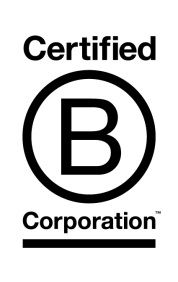This article originally appeared on USGreenChamber.com
Do you think business should be about more than making profit? You’re not alone. Many corporate CEO’s feel the same way.
An exciting option became available in 2007 when the non-profit B Lab introduced the Benefit corporations business certification. B Corps were designed for for-profit entities wanting to focus on social issues and the environment along with profit. This certification was created by three young successful entrepreneurs who, says Bryan Welch, CEO of B corporation Ogden Publications, “decided to revolutionize businesses in a non-pretentious, serious way.”
B corps fit in-between the legal structure of a C corp and a 501c3, says Chaz Berman, CEO of Growers Secret, a San Francisco B corp that produces top quality organic fertilizer products.
Since 2010, when Maryland became the first state to pass B Corps legislation, 27 states plus Washington, D.C. have signed on. Over 1,000 businesses of varying sizes and industries in 34 countries are now certified B Corps.
B Corps fall into two categories. Where state legislation allows you to change your Articles of Incorporation, you can become a certified B Corp. If your state doesn’t allow this (or even if it does), businesses can follow the methods / philosophies of a B Corp. As long as you’re a for-profit company with a mission-based focus, even sole proprietors and partnerships can become certified.
Becoming a certified B Corporation starts with taking the online Impact Assessment. Through probing questions and good analytics, you examine your company’s social and environmental practices.
The assessment examines all aspects of your business – governance, leadership, benefit packages, how you treat employees. Assessment questions include:
- Do you measure the waste you produce annually?
- What was your water usage for the past year?
- What percentage of energy use has been saved due to conservation and efficiency improvements for your corporate facilities?
- How many miles away are your major suppliers to reduce your transportation carbon footprint?
- Do your suppliers use solar energy?
Berman says he found these questions very revealing. He’d never thought to ask some of them before. Through this process he discovered that one of his suppliers was within 50 miles and generated 85 percent of their energy from solar energy!
“You can learn a lot from living the assessment,” said Elissa Miller-Out, CEO of Singlebrook, a custom web and mobile software B corp specializing in projects for universities, social enterprises and non-profits.
The assessment is very comprehensive, says Miller-Out. .”(It’s) designed to combat greenwashing,”
Transparency is a big part of being a B corp. Your assessment scores are posted on B Lab’s website, available for all to see.
“It (becomes) a tool for consumers,” said Miller-Out. “It’s a great way to evaluate the company behind the product.”
There are plenty of benefits to being a B corps.
“You start attracting more conscientious people to work for you,” said Welch. “It immediately improves your productivity, your working environment and the culture of your business,” he said.
Andy Keller, founder and CEO of ChicoBag, noted that one benefit of being a B Corp is joining a community of businesses that are trying to change things, to hold themselves to a higher standard.

Benefit corporations are recognized with this award for making the biggest social and environmental impact in the world.
“It’s (a way) to show the world that business can be done in a way that’s helpful and beneficial to the community and to the environment,” Keller said.
Environmental awareness plays a big part here.
ChicoBag, which produces high quality, durable reusable bags and promotional items that are long lasting, was recently awarded the Best for the World award for ranking in the top 10 percent for their overall Environmental Impact as a B Corp.
San Francisco-based Rimon P.C. – the first law firm to be certified as a B Corp. – operates with a tiny fraction of the carbon footprint generated by traditional law firms, says Partner and Chief Operating Officer Yaacov Silberman.
They do an annual carbon assessment to measure their carbon output from travel, commuting, paper, shipping, energy usage. They buy gold standard offsets each year to offset those carbon outputs. Many of their people work remotely, doing meetings by video. All these factors greatly reduce their carbon output, said Silberman.
Sean Kelly, CEO of Helping Unite Mankind And Nutrition (H.U.M.A.N.), an award-winning nutrition distribution platform utilizing healthy vending machines, says B corps are to companies as Fair Trade is to coffee.
“You can focus on your people, your business, your shareholders (and) your customers. You can focus on the earth. You can focus on all these things equally,” said Kelly, “and it’s better business.”
“It makes everything more enjoyable,” he said.
“It’s inherently more satisfying than just making more money,”said Welch. “How different it feels to get up in the morning and know you’re going to do something good in the world just by running your business. It’s a huge lifestyle enhancement and it doesn’t cost anything really,” he said.
The annual fee to be certified as a B Corp is affordable, especially for small businesses.
“Take the assessment,” said Silberman. It’s free and “it gives great advice of things you can do to become a better company.”
Filed under: Making a Difference | Tagged: B Lab, Benefit Corporations, Bryan Welch, carbon assessment, carbon footprint, certified B Corp, ChicoBag, conservation, energy, environment, Growers Secret, healthy vending machines, Helping Unite Mankind And Nutrition, Ogden Publications, organic fertilizer, Rimon P.C., Sean Kelly, solar energy, U.S. Green Chamber, waste, water usage |





Leave a comment